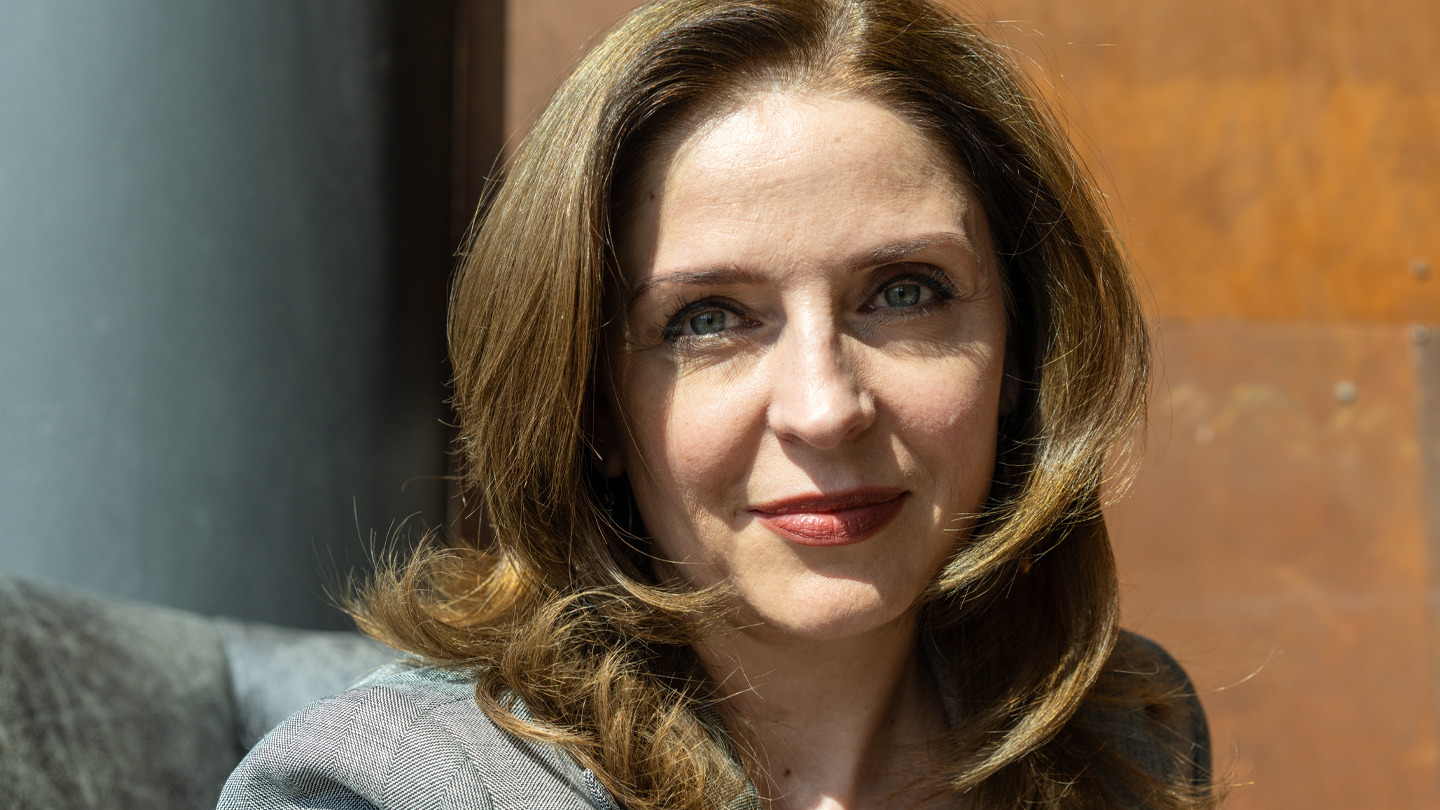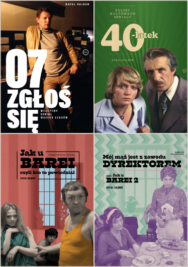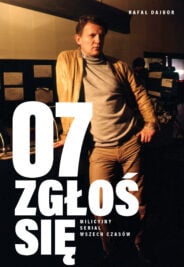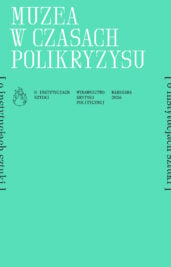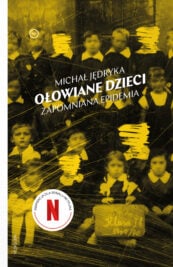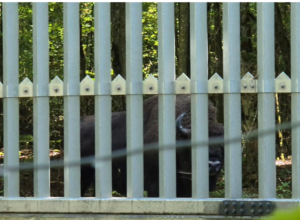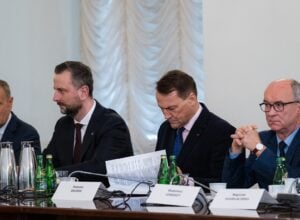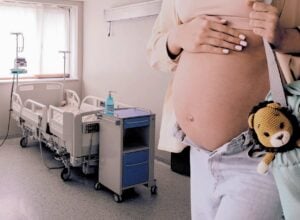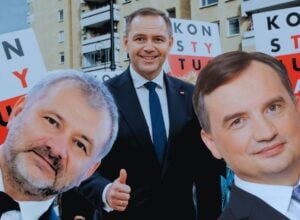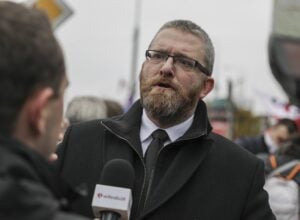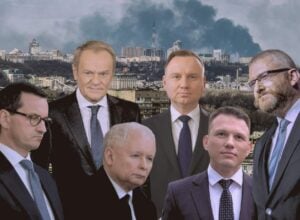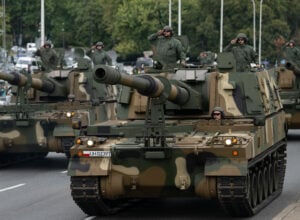Katarzyna Przyborska: Piotr Zgorzelski, wicemarszałek Sejmu z PSL i wasz koalicjant z Trzeciej Drogi, pochwalił pomysł objęcia dzieci ukraińskich obowiązkiem szkolnym, ale zaniepokoił się, że Ministerstwo Edukacji będzie neutralne w sprawie programu nauczania w szkołach tzw. sobotnich, ukraińskich. „Nie może być zgody na treści budujące tożsamość młodych Ukraińców na ideologii banderowskiej” – powtarza w różnych mediach. Ale nie ma problemu z tym, że państwo nie ma wpływu na treści przekazywane na lekcjach religii.
Joanna Mucha: Wypowiedź marszałka Zgorzelskiego uważam za co najmniej niemądrą. Te dzieci są w Polsce od dwóch i pół roku. Do czerwca uczyły się w ukraińskich szkołach albo w ukraińskim systemie online. Nie słyszałam, żeby w tym czasie marszałek martwił się programem. My, włączając dzieci ukraińskie do polskiego systemu edukacyjnego, zwiększamy kontrolę nad nauczanymi treściami. A poza tym doszukiwanie się w systemie edukacyjnym Ukrainy jakichś wrogich treści w stosunku do Polski nie ma sensu. Przypomnę, że powołaliśmy Wspólną Ukraińsko-Polską Komisję Ekspertów ds. doskonalenia treści podręczników szkolnych z historii i geografii, której celem jest właśnie sprawdzenie treści edukacyjnych z historii, z geografii, żeby znaleźć w nich to, czego wspólnie chcemy nasze dzieci uczyć. Tak żeby budować mosty, a nie tworzyć podziały.
Czyli będzie to edukacja dla przyszłości?
Z myślą taką, żeby pamiętać o przeszłości, ale pielęgnować dobrą relację między dwoma narodami. Oczywiście, w przeszłości naszych dwóch krajów są elementy trudne, ale to nie znaczy, że w systemie edukacyjnym nie jesteśmy w stanie wypracować takich treści, które obie strony zaakceptują. Wszyscy ci, którzy przeżyli te straszne wydarzenia sprzed dekad, mówią, że najważniejsze jest, by to się nigdy nie powtórzyło. A żeby się nigdy nie powtórzyło, musimy budować porozumienie między naszymi narodami.
Dzieci uchodźcze są w wielu polskich szkołach od dwóch lat i już zdążyły spotkać się z wrogością innych uczniów, którzy wypominali im Banderę, stale obecnego zresztą w polskiej publicystyce, czy Wołyń. Za czasów Przemysława Czarnka, w środku rosyjskiej inwazji, w czasach mało sprzyjających namysłowi nad przeszłością, promowano konkurs szkolny o zbrodniach wołyńskich.
Minister Czarnek nie zrobił dobrej roboty. Nie monitorował ukraińskich szkół – ani stacjonarnych, ani online – przez 2,5 roku. Nie miał czasu, żeby się tym zająć, ale zdążył rozdać sporo pieniędzy swoim znajomkom.
Po co PSL miesza się do edukacji? Naprawdę mamy za mało patriotyzmu w szkole do tej pory?
Po wypowiedzi marszałka Zgorzelskiego rozmawiałam z innymi przedstawicielami PSL-u. Oni nie podzielają tej narracji. Wręcz przeciwnie, niektórzy byli oburzeni jego słowami.
Ale za pomysłem wychowania patriotycznego i pakietu patriotycznego stoi nie tylko marszałek Zgorzelski, ale i Władysław Kosiniak-Kamysz.
W moim przekonaniu jest to poszukiwanie głosów po stronie wyborców PiS-u, tworzenie dla nich oferty politycznej.
Czy to jest wygodne dla Polski 2050?
MEiN co roku opracowuje tzw. priorytety edukacyjne. W tym roku wychowanie obywatelskie i patriotyczne jest na drugim miejscu wśród tych priorytetów, zaraz za zdrowiem. Zarzut, że wychowania patriotycznego jest za mało, uważam za nierozsądny. Natomiast zastanawiam się, czy PSL nie chce stosować taktyki polegającej na tym, że będzie zgłaszał projekty, które poprze PiS, budując większość sejmową i zaznaczając swoją pozycję polityczną. Jeśliby się tak miało zdarzyć, to uważam, że byłoby to bardzo niebezpieczne dla całej Koalicji 15 października i przekraczałoby granice dobrej współpracy.
Czy PSL może mieć pokusę, żeby zagrozić istniejącej koalicji rządowej i wejść w alians z PiS-em?
W tym Sejmie w moim przekonaniu nie ma możliwości. To oznaczałoby współpracę z całym PiS-em, a wydaje mi się, że większość posłów PSL-u się na to nie zgodzi. Jesteśmy w pewien sposób na siebie skazani, jako te cztery elementy Koalicji 15 października. Nadwyrężanie tej relacji uważam za skrajnie nieodpowiedzialne.
Wróćmy zatem do edukacji. Ciekawi mnie cel objęcia dzieci ukraińskich obowiązkiem szkolnym, realizowanym właśnie w polskich szkołach. Minister Duszczyk w jednym z wywiadów zdawał się sugerować, że chodzi przede wszystkim o to, żeby sprawdzić, czy ktoś nieuprawniony nie bierze 800 plus. Trochę mnie to zdumiało.
Jesteśmy z panem ministrem w ciągłym kontakcie – głównym celem wprowadzenia obowiązku szkolnego dla dzieci ukraińskich jest to, żeby te, które przez cztery lata były w systemie online, bo to są dwa lata pandemii i dwa lata wojny, wreszcie otrzymały dostęp do edukacji. Każde dziecko ma do tego prawo, a my jako społeczeństwo nie powinniśmy szykować sobie przyszłości, w której bardzo duża grupa obywateli – a nie wiemy, jaka część tych dzieci zostanie u nas, a jaka wróci do Ukrainy – jest tej edukacji pozbawiona. Gdzie oni się znajdą na rynku pracy? To jest nasza wielka odpowiedzialność.
W takim razie oddycham z ulgą.
Natomiast zweryfikowanie płatności 800 plus jest dodatkowym celem, bo wiemy, że jest jakaś grupa, która pobiera to świadczenie, a w ogóle nie mieszka w Polsce.
Czy obowiązkowa edukacja dzieci uchodźczych w polskich szkołach była konsultowana z ukraińskim Ministerstwem Oświaty i Nauki? Na początku wojny była mowa o tym, że nie zmuszamy wszystkich uczniów do wejścia do polskiego systemu, bo zakładamy, że obywatele Ukrainy nie zostaną w Polsce i że nawet nie powinniśmy Ukrainy z obywateli ograbiać, mimo że przydaliby się na naszym rynku pracy.
Jesteśmy w stałym kontakcie z Ministerstwem Oświaty i Nauki Ukrainy, z ministrem Oksenem Lisowym i z wiceministrem Jewhenem Kudriawecem. Strona ukraińska jak najbardziej akceptuje nasz pomysł, zgadza się w pełni na to, co więcej, wprowadza podobne rozwiązanie u siebie, bo dzieci ukraińskie, które migrowały wewnątrz Ukrainy i pozostawały w systemie online, od września tego roku również będą musiały zapisać się do szkoły stacjonarnej.
A czy była taka możliwość, żeby wesprzeć szkoły ukraińskie, które powstały po inwazji w Polsce, zwiększyć ich liczbę, żeby dzieci ukraińskie mogły kontynuować naukę według swojego programu, tyle że u nas? Razem z ukraińskimi dziećmi uchodziły z Ukrainy ukraińskie nauczycielki, wystarczyłoby udostępnić budynki.
Takie szkoły powstały i taka edukacja była prowadzona poza nadzorem naszego systemu edukacyjnego, ale nie mogło to trwać wiecznie, bo nasze prawo oświatowe po prostu na to nie zezwala. Jesteśmy w stałym kontakcie z tą grupą szkół, które w ten sposób funkcjonowały i które od 1 września zaczną realizować polski program nauczania. Dlaczego? Nie jest dobrym pomysłem, by pozwalać na tego typu wyjątkowe funkcjonowanie mniejszości czy grupy uchodźczej, bo jej członkowie mają potem trudności w integracji. Dlatego jak najbardziej jesteśmy zainteresowani tym, żeby dzieci z Ukrainy miały możliwość uczenia się języka ukraińskiego, żeby mogły mieć swoje zajęcia sobotnie, gdzie nauczą się o swojej historii, o swojej geografii, poznają swoje piosenki. Natomiast nie możemy pozwolić na to, żeby funkcjonowały w odrębnym systemie edukacyjnym, bo to w moim przekonaniu wywoływałoby w dłuższej perspektywie niekorzystne skutki społeczne.
Wiadomo, że brakuje nauczycielek w polskich szkołach. Czy ministerstwo sięgnie po nauczycielki ukraińskie? Wiem, że już przynajmniej 350 z nich nostryfikowało dyplomy przy wsparciu Polskiego Centrum Pomocy Międzynarodowej, ze środków CARE. Czy będą uczyły i polskie, i ukraińskie dzieci? Czy zostaną asystentkami kulturowymi?
Bardzo chcemy te nauczycielki włączyć do naszego systemu edukacyjnego i to się już dzieje. Jeśli mają nostryfikowane dyplomy, za co odpowiada Ministerstwo Nauki, z którym cały czas pracujemy, żeby większa liczba mogła tego dokonać, to nauczyciel, jeśli zna język polski, może uczyć tego przedmiotu, którego uczył w Ukrainie.
A jeśli nie zdołał nostryfikować dyplomu?
Wtedy może pracować w charakterze nauczyciela na przykład języka ukraińskiego czy jako asystent międzykulturowy.
Czy prowadzicie rozmowy z samorządami w tej sprawie? Nie będzie oporu z ich strony?
Będziemy starali się pomagać samorządom w zatrudnianiu tych osób. Udało nam się zdobyć bardzo duży grant europejski. W tej chwili jesteśmy na etapie kończenia pisania programu rządowego, który zagospodaruje te pieniądze. Bardzo duża część tych środków będzie przeznaczona właśnie dla samorządów, na zatrudnienie asystentów międzykulturowych. Naprawdę ważną kwestią jest zatrudnienie ich dla dzieci ukraińskich pochodzenia romskiego. One też będą objęte obowiązkiem szkolnym, a często nie znają nawet ukraińskiego. Niektóre nie potrafią pisać, nie czytają, bo miały problem z dostępem do szkół w Ukrainie.
Czy język ukraiński wejdzie do polskiego programu jako opcja do wyboru, jak hiszpański czy niemiecki?
Język ukraiński już jest w polskim systemie. Jeśli w szkole zbierze się wystarczająca grupa uczniów, jeśli jest możliwość znalezienia nauczyciela języka ukraińskiego, to każda szkoła może organizować takie zajęcia.
Część dzieci zapewne będzie potrzebowała klas przygotowawczych. Czy one się zmieszczą w szkołach?
Klasy przygotowawcze będą mogły być tworzone, ale to jest decyzja samorządu albo dyrektora szkoły. Udostępniliśmy samorządom i dyrektorom zestaw najlepszych praktyk, które udało się wypracować podczas pierwszej fali przyjęcia uchodźców. Jeśli zdarzy się, że do małej szkoły zostanie przyjęta większa grupa uczniów ukraińskich, to może wystąpić sytuacja, w której taki oddział przygotowawczy okaże się potrzebny, i wtedy jak najbardziej można go będzie stworzyć. Ale szczerze powiem, że nie spodziewam się, żeby dużo oddziałów przygotowawczych na tym etapie powstawało. Myślę, że to będą raczej wyjątkowe sytuacje wynikające z tego, że gdzieś był ośrodek zbiorowego zakwaterowania i jest większa grupa uchodźców.
A czy udało się okroić podstawę programową, dostosować program?
Mam wrażenie, że nasz program jest nadal przeładowany, mimo że udało nam się te 20 proc. – w cudzysłowie oczywiście – podstawy programowej ściąć. Do tego wciąż skupia się on na wiedzy i informacji, a nie na kompetencjach i umiejętnościach. Ta zmiana jeszcze przed nami, ale to jest proces, nie uda się z dnia na dzień ani nawet z roku na rok. Trzeba przygotować nauczycieli, a także rodziców. Pracujemy nad tym.
Nauczyciele są pełni obaw. Sławomir Broniarz w niedawnej rozmowie w TOK FM zgłaszał poważną wątpliwość odnośnie do wydolności polskich szkół. Mówił o wielkim optymizmie ministerstwa i dawał za przykład widełki dzieci ukraińskich, których się można w polskich szkołach spodziewać w tym roku. I te widełki są bardzo szerokie, bo między 20 tysięcy a 150 tysięcy. Pani mówiła o 80 tysiącach.
Nie wiem, skąd pan prezes Broniarz ma takie informacje. Przedstawianie danych w ten sposób jest nierozsądne. Rzeczywiście, trudno jest określić dokładną liczbę, ale to jest chyba oczywiste dla każdego, kto zdaje sobie sprawę z tego, że te dzieci migrują. Przecież są dzieci, które nawet w ciągu miesiąca są parę razy w Ukrainie, parę razy w Polsce. Analizując różne nasze dane i te, które otrzymaliśmy od strony ukraińskiej, szacujemy, że to jest 60 do 80 tysięcy dzieci, które dojdą do polskiego systemu edukacyjnego. To jest duża liczba, ale ona wśród samorządowców nie budzi obaw.
Rozmawiała pani z samorządowcami? Jakie są nastroje, czy czują się przygotowani?
Rozmawiałam. Twierdzą, że nie powinno to stanowić żadnego problemu. Oczywiście to jest wyzwanie, bo każde nowe dziecko, szczególnie niemówiące w języku polskim, jest wyzwaniem dla konkretnego nauczyciela, dla konkretnej klasy. Ale damy sobie z tym radę. Jesteśmy dobrze przygotowani.
A czy mamy wystarczająco biurek, stołów i ławek? Bo jeszcze do niedawna szkoły były przeciążone. Podwójne roczniki, zmianowość.
Cały czas mówimy, że szkoły są przeciążone. A prawda jest taka, że przeciążone są najczęściej szkoły w dużych miastach, natomiast w małych miejscowościach i na wsiach szkoły są bardzo często bardzo małe i mało dzieci do nich uczęszcza.
No tak, ale uchodźcy są tam, gdzie łatwiej o pracę, a łatwiej o pracę jest w dużych miastach.
W dużych miastach rzeczywiście od czasu do czasu może się zdarzyć konieczność powiększenia klasy. Daliśmy taką możliwość, ale spodziewamy się, że to będą sytuacje pojedyncze. Bo też proszę pamiętać o tym, że mamy do czynienia z niżem, kolejne roczniki są coraz mniej liczne. Naprawdę sobie poradzimy.
A czy uczniowie polscy są przygotowani na kolegów z Ukrainy? Widać w społeczeństwie nastroje antyukraińskie, podatność na propagandę sączoną różnymi kanałami przez Kreml.
Oba nasze ośrodki, czyli Ośrodek Rozwoju Edukacji i Instytut Badań Edukacyjnych, pracują w tej chwili nad masowymi szkoleniami, które również zaoferujemy w ramach tego europejskiego grantu. To program, który obejmie kwestię integracji, pracy w środowisku wielokulturowym, pracy z dzieckiem z traumą. Tych narzędzi będzie więcej niż dotychczas. Nauczyciele odczują, że różnica jest istotna w stosunku do pomocy, której niewiele otrzymali wtedy, kiedy Ukraińcy przyjechali do Polski w tej pierwszej fali uchodźczej.
A co z psychologami? Bo psychologów nie starczało dla polskich uczniów. Wiemy, że mamy kryzys zdrowia psychicznego wśród młodzieży. A teraz jeszcze dojdą dzieci z traumą wojenną.
Dlatego chcemy, żeby pomocy ukraińskim uczniom udzielali ukraińscy psychologowie. Dlatego również w odniesieniu do tej grupy bardzo blisko współpracujemy z Ministerstwem Nauki, żeby proces nostryfikacji ich dyplomów był jak najszybszy. Ale zdajemy sobie sprawę, że nie damy rady zaspokoić wszystkich potrzeb, prawdopodobnie część tej pomocy będzie musiała być udzielana w formie terapii grupowych.
Rozumiem, że nie tylko dlatego, że to skuteczna forma terapii, ale psychologów ukraińskich też jest mało?
Zdecydowanie za mało w stosunku do potrzeb.
Czy mogłaby pani wymienić kilka organizacji pozarządowych, które zajmowały się wcześniej uchodźcami, współpracowały i wytwarzały te narzędzia, których teraz będzie można używać powszechniej? To tylko te dużo organizacje, jak UNICEF czy CARE, czy też te, które zorganizowały się oddolnie i wzięły na siebie odpowiedzialność po 24 lutego?
Współpracowałam z zespołem różnego rodzaju organizacji charytatywnych, pozarządowych, a w tej chwili powołałam zespół, którego zadaniem będzie monitorowanie procesu integracji. Będziemy spotykać się raz w miesiącu, żeby omówić wszystkie trudne sytuacje, żeby jak najlepiej odpowiedzieć na wyzwania.
Ten zespół składa się z organizacji pozarządowych, organizacji charytatywnych, UNICEF-u czy CARE, przedstawicielek szkół funkcjonujących dotąd jako ukraińskie i samorządowców. Myślę, że nie pominęliśmy żadnego środowiska, które w tym procesie może pomóc.

 Wspieraj
Wspieraj 

 Wspieraj
Wspieraj  Wydawnictwo
Wydawnictwo 
 Przekaż
Przekaż 
